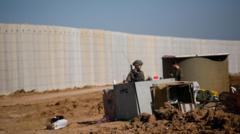The deadline for the Israeli withdrawal from southern Lebanon, set as part of a ceasefire agreement, expired early Sunday without significant change on the ground. Although the US and France brokered a 60-day deal aimed at ending 14 months of conflict, Israel has announced it will keep troops in certain areas, citing incomplete implementation of the ceasefire terms, particularly concerning Hezbollah’s withdrawal.
The ceasefire agreement, which sought to replace Hezbollah’s dominance in the region with the Lebanese army, represents a crucial test for the newly elected Lebanese president, Joseph Aoun. On Saturday, Aoun’s office indicated ongoing consultations aimed at addressing escalating tensions with Israel, which it described as "dangerous practices." The potential for conflict looms large, especially as Hezbollah has not publicly outlined its intentions in light of Israel's continued military presence.
The current tension follows a significant escalation of conflict last September, resulting in approximately 4,000 casualties—mostly civilians—and displacing over 1.2 million people in Lebanon. Israeli strikes and political maneuvers to weaken Hezbollah have left the group in a precarious position, as they try to navigate a post-conflict landscape amid declining political influence.
Israel maintains that the completion of its troop withdrawal depends on the effective deployment of Lebanese forces in southern Lebanon and the removal of Hezbollah beyond the Litani River. An Israeli statement highlighted the need for a gradual withdrawal process, conducted in coordination with the US, although no specific timetable was given.
The Lebanese army has reported challenges in advancing its deployment, citing delays resulting from Israel’s procrastination, urging civilians to avoid returning to sensitive border regions. Meanwhile, Hezbollah's silence regarding potential retaliation for the failure to meet the withdrawal deadline suggests it is treading cautiously as it assesses its weakened position following relentless Israeli operations.
The background context reveals that the ceasefire deal was largely perceived as a concession by Hezbollah, whose military capabilities and infrastructure faced significant damage from its conflict with Israel, compounded by the loss of key leaders. Many Lebanese citizens have expressed opposition to extending military hostilities, suggesting that any perceived aggression from Hezbollah could provoke internal dissent among its supporters.
As Lebanon's new leadership attempts to reclaim authority over state military and political frameworks, the implications of the continued Israeli presence in southern Lebanon introduce uncertainty about the future of military engagement in the region. New measures to rebuild governance and mitigate corruption have been promised, but the challenge remains in regulating Hezbollah’s armed presence amidst a fragile political landscape.
















